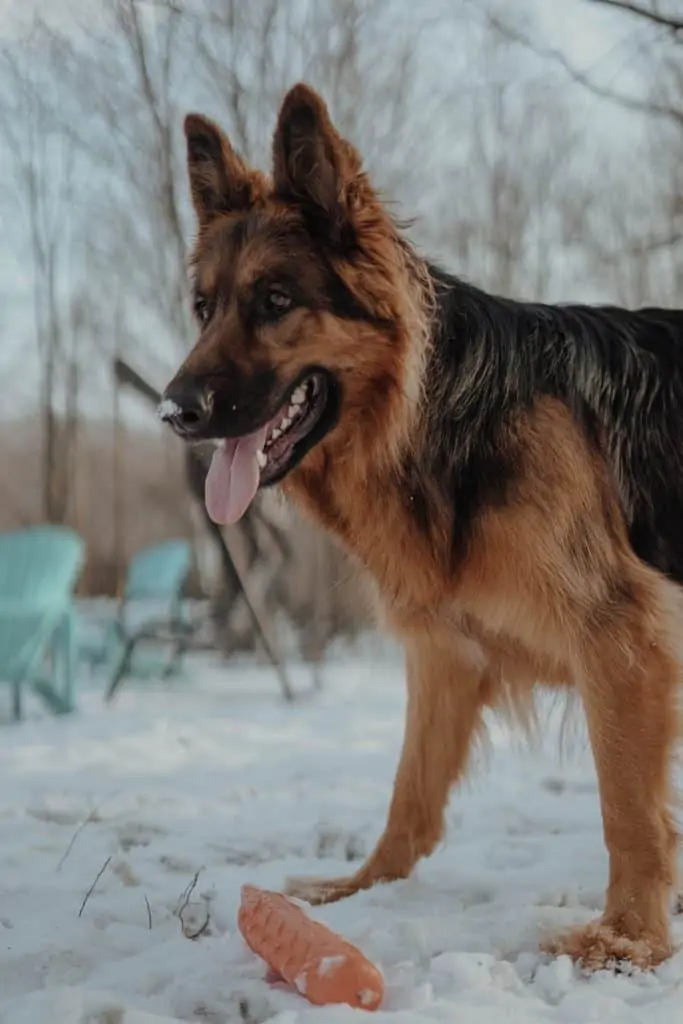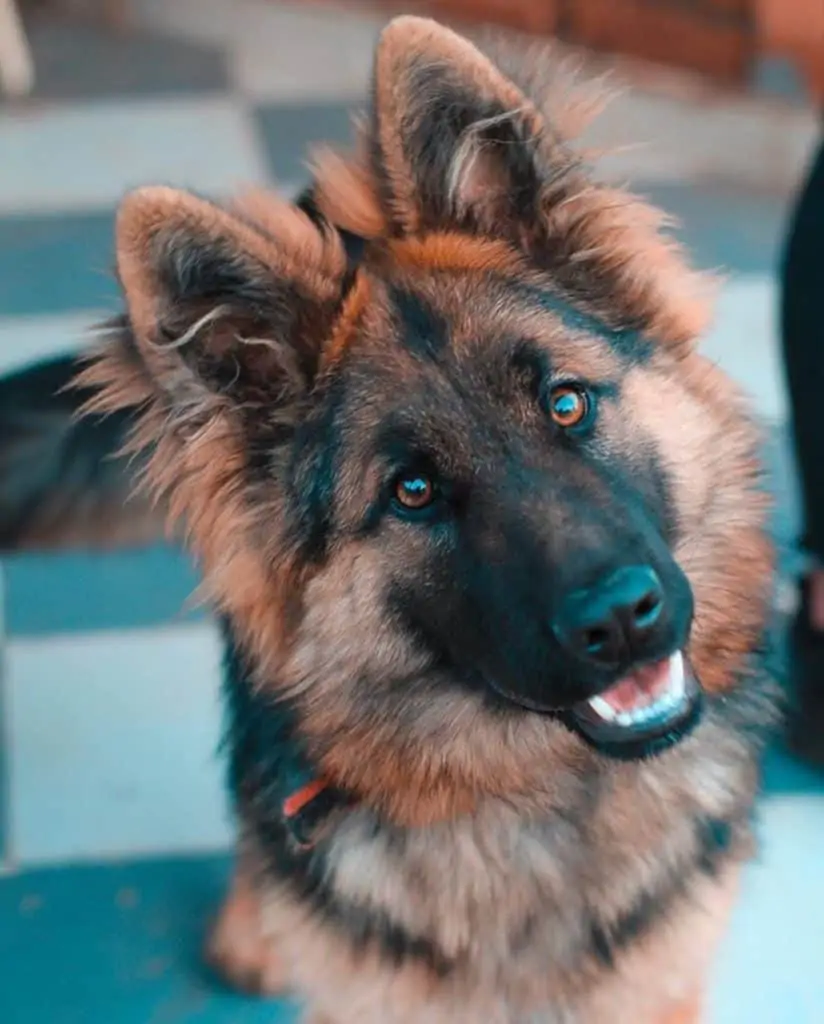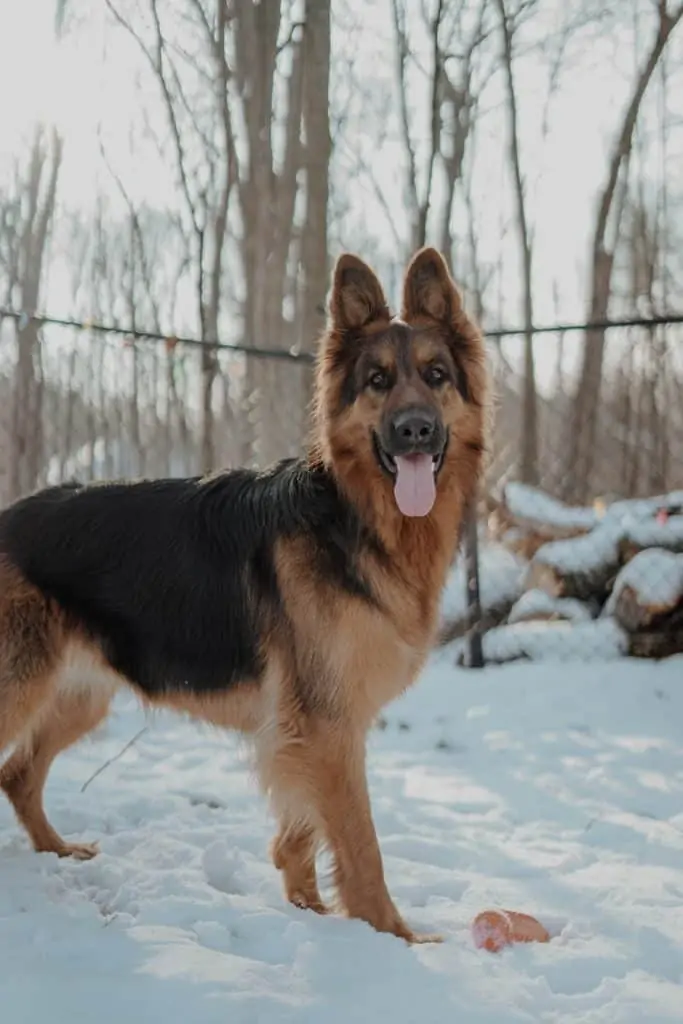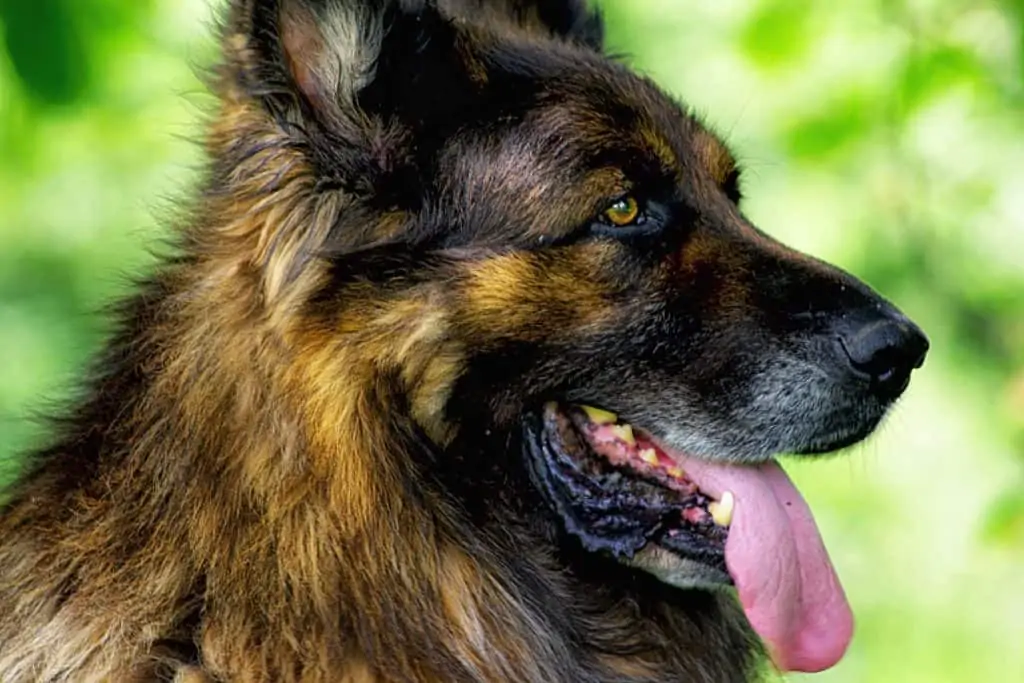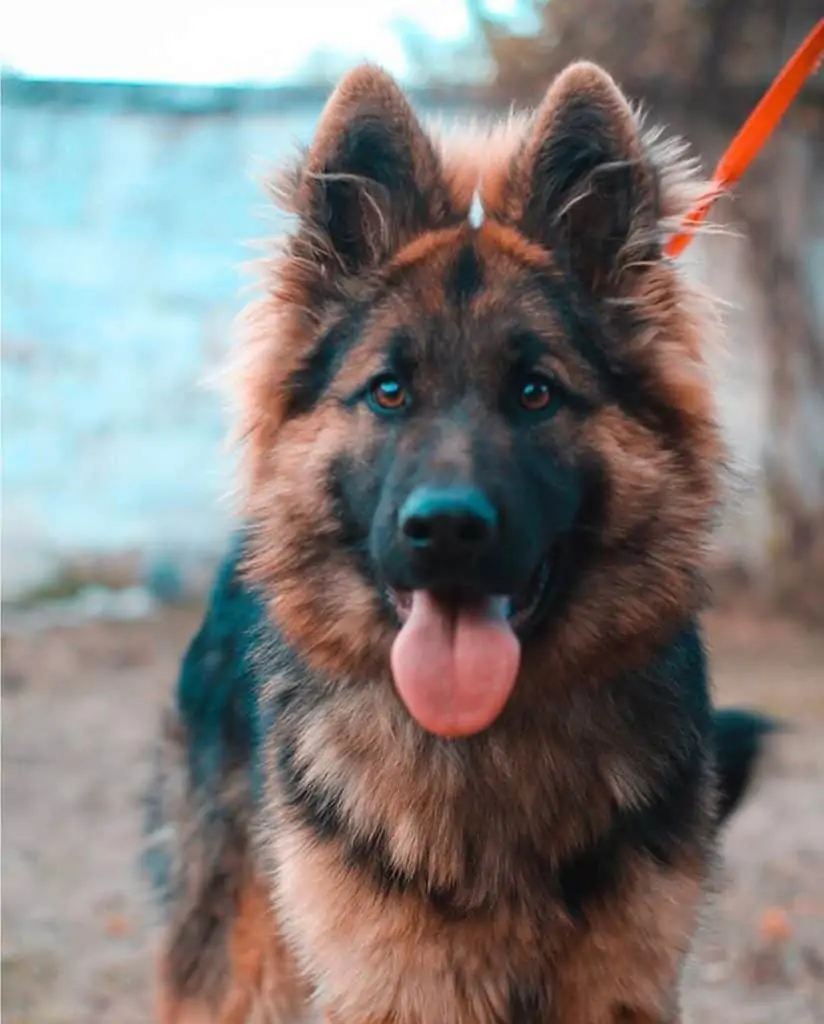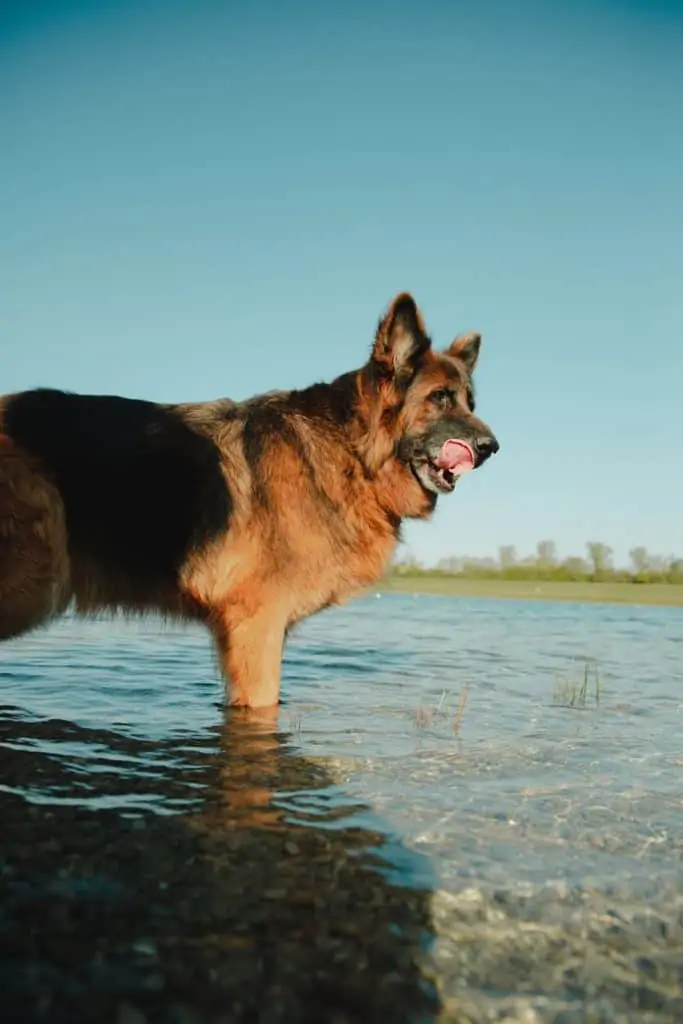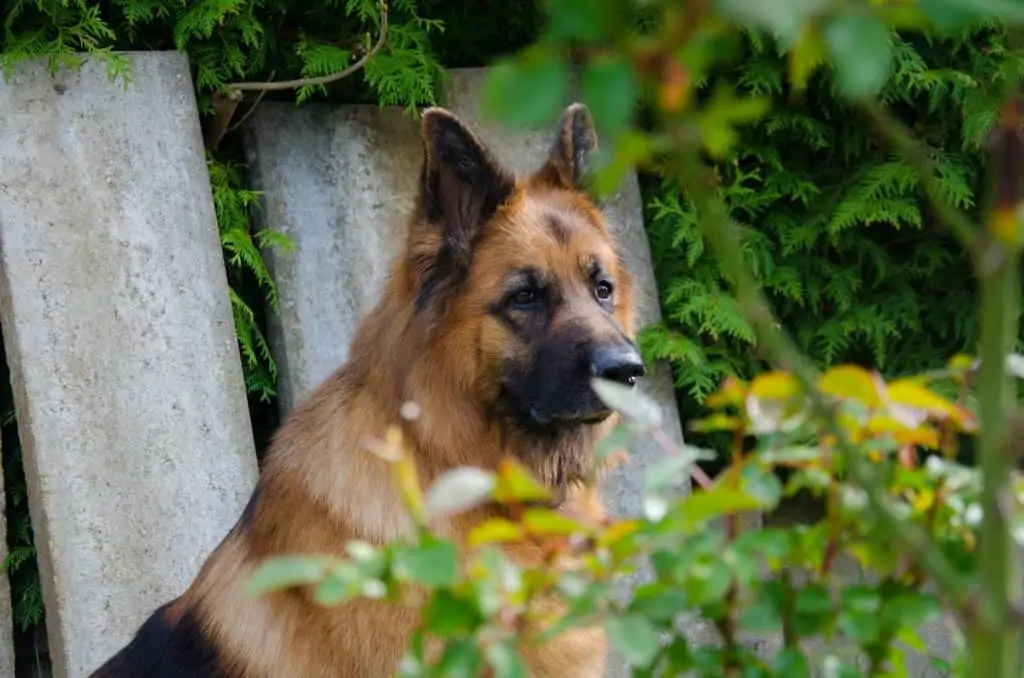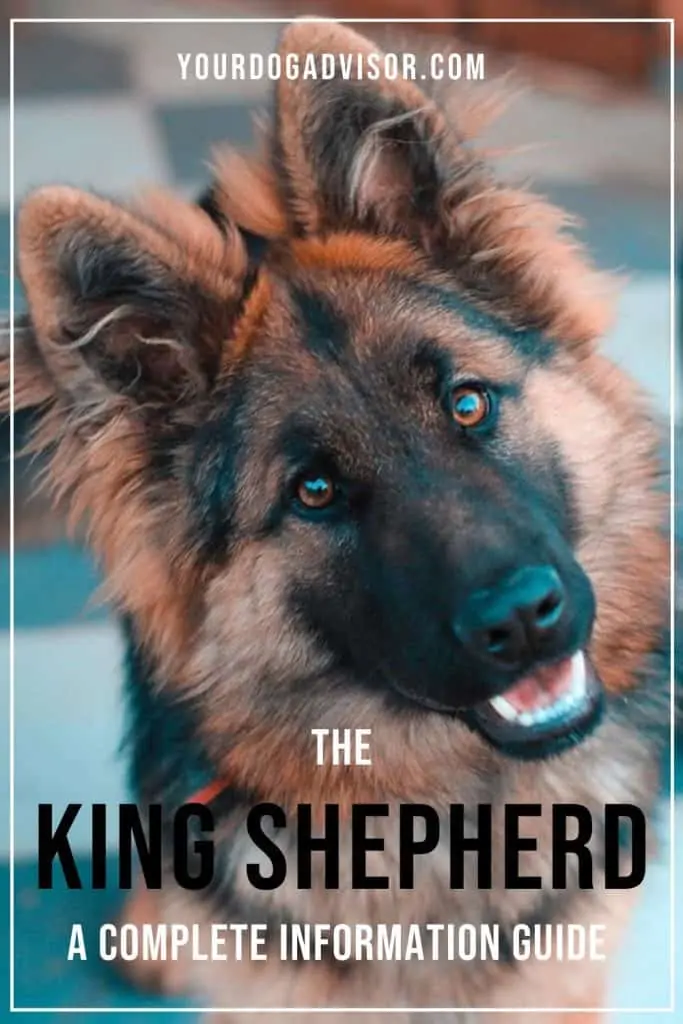With the appearance of a massive German Shepherd and the playfulness of a Lab, King Shepherds are becoming increasingly popular dogs for active families.
That said, this is a mixed breed surrounded with controversy and a dog that may be more high maintenance than you think.
Are you considering investing in a King Shepherd? If so, you’ll want to keep reading. Today’s article is designed to help you decide if this hybrid dog would be the right addition to your home and lifestyle.
Let’s begin.
Contents
An Overview Of The King Shepherd
The King Shepherd is a large hybrid dog related to the German Shepherd.
Classification: Hybrid
Average Height: 25 to 31 Inches
Weight: 75 to 150 Pounds
Coat Type: Dense, Double-Coated, Shedding
Coat Colors: Red, Black, Fawn, Sable, And Brown
Hypoallergenic: No
Temperament: Work-Oriented, Devoted, Affectionate, Intelligent
Ideal For: Experienced Dog Owners With Lots of Space
Lifespan: 10 to 11 Years
Health Issues: Hip Dysplasia, Elbow Dysplasia, Hypothyroidism, Von Willebrand’s Disease, Eye Issues, Degenerative Myelopathy, Pancreatic Issues, Thrombopathia, Gastric Dilatation-Volvulus, and Allergies
Clubs That Recognize The King Shepherd:
- The American King Shepherd Club (AKSC)
- THe American Rare Breed Association (ARBA)
- The American Pet Registry, Inc. (APRI)
- The Eastern Rare Breed Dog club (ERBDC)
- The Dog Registry of America, Inc. (DRA)
- The World Wide Kennel Club (WWKC)
- And The States Kennel Club (SKC)
The King Shepherd Origin – What You Should Know About Hybrid Dogs
Like many modern-day crossbreeds, the King Shepherd has a history of controversy to overcome.
Though he’s already called a king, the King Shepherd is actually a newer hybrid to the canine kingdom. He was created in the early 1990s by breed enthusiasts David Turkheimer and Shelley Watts-Cross, two American’s keen on creating a larger, healthier German Shepherd type dog.
Because he is so new, the King Shepherd is still not considered a purebred. This means he yet to be recognized by some of the most prominent breed clubs in the world including the American Kennel Club and the United Kennel Club.
That said, this dog did make a name for himself in 1995 when he was officially recognized by several other breed clubs including:
- The American King Shepherd Club (AKSC)
- THe American Rare Breed Association (ARBA)
- The American Pet Registry, Inc. (APRI)
- The Eastern Rare Breed Dog club (ERBDC)
- The Dog Registry of America, Inc. (DRA)
- The World Wide Kennel Club (WWKC)
- And The States Kennel Club (SKC)
But just how did the King Shepherd come about?
The King Shepherd origin always contains German Shepherd lineage, though other dogs can be combined in your specific King Shepherd depending on the breeder who produced him.
Usually, King Shepherds are a mix between German Shepherds, Alaskan Malamutes and Akitas.
For this reason, your King Shepeherd’s temperament, health, and even appearance can be left up to chance. And this is where the crossbreed controversy comes in.
The Crossbreed Controversy
Most crossbreeds or hybrid dogs are dogs that have two specific purebred parents. One of the most popular hybrids you’ve probably heard of would be the Labradoodle. However, it is possible that a mixed breed has three or more purebred parents without being considered a mutt.
But how?
Mixed breeds like the King Shepherd are sometimes referred to as designer dogs. They differ from mutts because they were purposefully “designed” by breeders in an effort to combine a list of qualities or traits from specific breeds.
In the King Shepherd’s case, his creators hoped to combine intelligence, work ethic, appearance and stamina with a reduced chance of health issues.
This is because purebreds like the German Shepherd (the dog the King Shepherd is designed to most closely emulate), has a smaller gene pool due to years of overbreeding. This makes the German Shepherd less healthy than some other breeds or mixes and more inclined to suffer from certain genetic health issues.
When you mix a dog like the German Shepherd with a variety of other breeds, you widen that gene pool and reduce the chances of the offspring inheriting specific conditions. This is what is known as Hybrid Vigor.
But while the theory of Hybrid Vigor is promising, it has yet to be widely accepted by everyone.
Unfortunately, while crossbreeding can reduce certain chances of inheriting specific health problems, it also lengthens the list of potential health issues a crossbreed dog may face as it exposes him to different genetic ailments from other breeds.
Another aspect that you should consider when considering a crossbreed dog is the idea of predictability. While the King Shepherd may be promoted and sold as if he is a purebred, the reality is that he is not, and his temperament, health and even appearance may be left up to chance.
This is especially true if you obtain a first, second or third generation crossbreed. That said, the King Shepherd has been around for nearly three decades. This means that there is a chance you could obtain one of these hybrids through a reputable breeder that has more predictable characteristics than many other crossbreeds.
And with that in mind, it’s time to find out if the King Shepherd would make the ideal companion for you. Let’s talk about temperament!
King Shepherd Temperament and Personality Traits
These dogs are intelligent and work-oriented. They will be happiest with a job to do.
Descending from several working breeds including the Akita, Alaskan Malamute and the German Shepherd, it’s no surprise that the King Shepherd is going to be highly intelligent. This is a dog that will require a hands-on owner who understands working breeds and who appreciates this type of dog’s unique way of thinking.
Energetic and devoted, the King Shepherd is a protective and formidable looking canine. That said, he is not known to be aggressive and makes a great dog to families with children and other pets.
Of course, his size should be considered when dealing with very small children or smaller pets. Playful and high-energy, the King Shepherd may not realize his own strength and could easily knock youngsters over or play too rough with smaller animals.
That aside, the King Shepherd is an athletic dog who enjoys being an adored member of his family. He does best with owners who have plenty of time and a flexible schedule, and he will not do well in homes where he is ignored or left outside all day.
While large, the King Shepherd is an indoor dog and he requires lots of time and attention. His clever mind means he can be susceptible to anxiety if left to become bored. He also becomes extremely bonded to his family and is fiercely devoted
Socializing And Training A King Shepherd
With the right training and socialization, King Shepherds grow up to be even tempered and friendly.
Training and socializing any dog is key to ensuring your dog grows up happy, healthy and well-rounded. This is especially true for large, work-oriented breeds who can be prone to protective instincts.
The King Shepherd is one such breed that will require a hands-on owner who is devoted to spending time ensuring their dog is constantly trained and socialized throughout his lifetime.
How To Train A King Shepherd:
Training should begin at an early age and continue throughout your King Shepherd’s lifetime. Remember, this is a highly intelligent canine who is eager to please, making him rather trainable when you use the right techniques.
However, as a working breed hailing from a herding dog, the King Shepherd can also be prone to stubbornness and independent thinking. Still, it’s important you refrain from punishing your King Shepherd during training and instead use positive reinforcement techniques like treats and praise.
Scolding or punishing your King Shepherd will only hinder his ability to retain the lessons you’re trying to teach him. Worse, it may harm the bond built between the two of you.
King Shepherds are large, but they are sensitive dogs. They enjoy pleasing their people but can become bored, so try and keep training sessions game-like and short. Five minute training sessions implemented several times a day are usually the most successful, especially when these sessions feel more like fun play for your dog.
And remember, training your King Shepherd is a never-ending process. No matter how old he gets or how long you’ve had him, training should continue to be a consistent part of your daily life with your dog.
How To Socialize A King Shepherd
Just as training should be consistent throughout your King Shepherd’s life, so should socialization. Properly soclaizaitong a dog can help reduce a variety of behavioral issues and helps to build confidence in your dog.
To ensure your King Shepherd is properly socialized, try and introduce him to as many new experiences as you can while he is young. Allow him to be played with and handled by strangers during puppyhood and encourage him to meet other animals including both dogs and cats.
Doing this can help reduce fear and anxiety, which can in turn reduce stress-based or fear-based aggressive tendencies.
Socialization can begin from the moment you get your puppy, though it is also possible to socialize an adult dog as well. That said, adult dogs that have not undergone proper socialization during puppyhood often require more time and commitment from owners.
Proper Exercise And Mental Stimulation For A King Shepherd
Due to their large size and good amount of energy, it’s best to invest in the right walking equipment.
Another thing we should note about working breeds like the King Shepherd is that they generally have quite a bit of energy. This is a dog who needs plenty of exercise each and every day to not only reduce destructive behaviors and emotional stress, but to also ensure this dog stays healthy.
The best exercise for a King Shepherd is going to be two walks a day that are around an hour or more in length for each outing. The King Shepherd will also need plenty of free playtime in a securely fenced backyard where he can run and burn off excess energy at his leisure.
When walking your King Shepherd, be sure to use the proper equipment. Since these dogs are strong and athletic, they may be prone to pulling on leash. However, it is best to avoid using prong collars and choke chains as these can cause damage to your dog’s throat and trachea.
Instead, try using a no-pull front clip harness, like the one listed below.
PetSafe No Pull Front Clip Harness
[amazon box=”B015TNVYRU” style=”light” title=”PetSafe Front Clip Harness” template=”widget” ]
The No Pull Dog Harness by PetSafe is a harness that is designed to safely reduce pulling without causing pain or discomfort. It works by allowing your leash to clip to the front of your dog’s harness, which reduces the dog’s natural urge to pull. It also gently redirects your dog back to you should he get ahead of himself.
This harness comes in a few different sizes, so make sure to do your measurements to ensure you get a harness that fits correctly. In order to work properly, the harness above should fit snugly and not fall loose around your dog’s body.
Along with daily exercise, it’s just as important to make sure you keep your King Shepherd mentally stimulated.
Remember, this is a clever dog who is bred for working purposes, and he will not be happy sitting around all day with nothing to do. This is a hybrid that will do best when given jobs to complete around the house. Some owners opt to teach their King Shepherd how to sort the dishwasher or bring in the mail.
You can also learn how to set up fun obstacle courses in your backyard and have your King Shepherd complete them for treats. When you’re gone, be sure to leave your King Shepherd with something to keep him busy, like a puzzle toy or a KONG.
Large KONG Toy For Dogs
[amazon box=”B0002AR0I8″ style=”light” title=”Large Dog KONG” template=”widget” ]
The KONG has long been considered a dog toy box staple because it not only keeps dogs busy and engaged, it also helps reduce anxiety that can lead to destructive behaviors. Since the King Shepherd is such a large dog, we recommend a large dog KONG.
You can fill the KONG with dog-safe peanut butter or treats, or even fill it with kibble.
How To Groom A King Shepherd
The King Shepherd has a thick, dense coat that requires routine brushing and upkeep.
Take one look at the King Shepherd and you may be put off by his dense, super fluffy coat. That has got to be wicked to groom, right?
Actually, wrong! The King Shepherd looks like he’s high maintenance when it comes to coat care but the truth is that this dog has a self-cleaning coat that’s relatively simple to take care of.
Bathing the King Shepherd only needs to be done once every six weeks or so using a quality shampoo and conditioner designed for dogs. Avoid shampoos that contain parabens, alcohols or dyes and instead stick with hypoallergenic shampoos that are specifically designed for a dog’s coat and skin.
If your dog gets wet or dirty between bathtime, you can usually just use grooming wipes or grooming combs to brush debris and dirt away.
That said, we should note that the King Shepherd is a heavy shedder. This could pose a problem for those who suffer from allergies or for those who are not keen on lots of dog fur in the home.
King Shepherds shed year round, and will need to be brushed at least once a week using a variety of grooming tools including a deshedding comb, an undercoat rake and a dematting comb. During shedding season, which occurs during spring and fall, the King Shepherd will shed even heavier.
He may need to be brushed two to three times a week during the shedding season to help reduce loose hair build up that can lead to skin problems and doggy odor.
The Furmanator Self-Cleaning Undercoat Rake
[amazon box=”B07MZBX5ZW” style=”light” title=”Furminator Comb” template=”widget” ]
The Furminator self-cleaning undercoat rake is a comb we recommend for heavy-shedders like the King Shepherd. This comb is designed to get into your dog’s dense and woolly undercoat and to remove built up hair and debris.
This comb is also easy to clean, providing you with a release button you can push to simply remove the collected loose fur so you can keep brushing.
The King Shepherd will also need to have his ears checked and cleaned often to keep them free of waxy buildup and moisture that can lead to ear infections. His teeth should be brushed daily using a dog-safe tooth brushing kit and toothpaste, and his nails should be trimmed or ground down often to prevent breaking.
Dog Nail Grinder
[amazon box=”B07PFCLHKR” style=”light” title=”Dog Nail Grinder” template=”widget” ]
Grinding your dog’s nails is sometimes easier than clipping them, especially if you’re concerned about trimming them too short. The above nail grinder is easy to use and includes a safe guard so you can’t go too short.
It is also quiet, which can help when dealing with fearful dogs who don’t enjoy having their paws or claws handled.
The King Shepherd’s Lifespan and Common Health Issues
Though the King Shepherd was bred to be healthier than the German Shepherd, he can be prone to a number of serious health concerns owners should be aware of.
Over the years, breeders have worked hard to ensure the King Shepherd is a healthy dog. That said, he can still be prone to a variety of health issues, many of which can be exasperated if you go through an irresponsible breeder to obtain your King Shepherd Puppy.
Let’s take a look at the lifespan of a King Shepherd and then talk about some of his most serious health issues.
Average King Shepherd Lifespan: 10 to 11 Years
Most Common King Shepherd Health Issues:
- Hip Dysplasia
- Elbow Dysplasia
- Hypothyroidism
- Von Willebrand’s Disease
- Eye Issues
- Degenerative Myelopathy
- Pancreatic Issues
- Thrombopathia
- Gastric Dilatation-Volvulus
- Allergies
- And Obesity
Since the King Shepherd can be predisposed to a number of serious health issues, it’s important for potential owners to have a good idea of preventative care. With that said, let’s talk a bit more about how to ensure your King Shepherd lives a healthy lifestyle.
Dietary Tips:
Many of the above health issues that a King Shepherd may face directly correlate with his diet. These health issues include Gastric Dilation-Volvulus (GDV or Bloat), obesity, pancreatitis and allergies.
You can help combat some of these issues by ensuring your King Shepherd is on a quality dog food specified for large breed dogs. His dog food should also be specified for his age and activity level.
Since the King Shepherd can be prone to allergies and obesity, we recommend choosing a limited ingredient diet dog food and investing in a slow feeder. Slow feeders not only help promote a healthy weight, they can also reduce the chances of your King Shepherd from suffering from Bloat.
Last, avoid giving your King Shepherd an abundance of human foods as treats. Greasy foods like bacon can lead to pancreatitis, which can land your King Shepherd in the hospital.
Instead, offer your King Shepherd treats that are healthy, low calorie and specifically made for dogs.
Vet Visits and Wellness Exams:
Like humans, a dog’s health can change over time. Catching health issues early can be key to ensuring your King Shepherd lives a long and healthy life. Preventive care can also save you lots of money in the long run.
Most vets recommend dogs under the age of seven be seen at least once a year for routine wellness exams. Dogs older than seven should be seen at least twice a year.
What To Consider Before Committing To A King Shepherd
King Shepherds are large, energetic dogs. They will do best in a home with lots of space and a backyard.
The King Shepherd is appealing to a variety of owners due to his unique look and agreeable temperament. However, it’s important for potential owners to remember that this is not a low maintenance dog.
The King Shepherd requires plenty of routine exercise, playtime, training, socialization and attention throughout the day.
He might also be prone to a number of serious and expensive health issues.
Before you decide to commit to a King Shepherd, you should consider your lifestyle and home environment. These dogs get along well with children and other pets, but they are very active and will not be the best apartment dogs.
They require a large backyard where they can run and play freely and owners who are active, outdoorsy and have flexible schedules.
It would also be wise to invest in health insurance if you’re considering obtaining a King Shepherd, as some of the health issues he could face down the road can be quite costly.
How To Find A Healthy King Shepherd Puppy Or Rescue Dog
When looking for a King Shepherd puppy, be careful and go through reputable breeders.
Though they have been around since the early 1990’s, King Shepherd dogs are still considered rare. This means that coming across one in a shelter might be difficult.
That said, if you do have your heart set on rescuing a King Shepherd, we hope you take some time to look. Consider contacting breed-specific shelters that focus on dogs like German Shepherds, Malamutes or Akitas, as many shelters often take mixed variations of these breeds, and this would include dogs like the King Shepherd.
You might get lucky and find the King Shepherd of your dreams in one of these locations. You can also search for breed specific shelters that specialise in King Shepherds, as these dogs can be too much for some novice dog owners.
Sadly, and for this reason, it is not unheard of that a King Shepherd will be surrendered by an overwhelmed owner.
Going through a rescue has plenty of benefits. In fact, many shelters offer a free initial vet exam and will have had their dogs undergo behavioral testing before placing them for adoption. You may also be able to get a dog that has already been spayed or neutered and find a dog that has been microchipped.
The cost of going through a rescue is usually much less expensive than going through a breeder, with most shelters charging around $250 to $500 in adoption fees.
However, there is no guarantee you will be able to find a King Shepherd through a rescue or shelter, as these dogs can be difficult to come by.
Luckily, there are a few reputable breeders who breed and sell this dog. On average, a King Shepherd puppy costs around $1,500 when going through a reputable breeder.
Before you buy your puppy, be sure that you do your research. Avoid breeders who are unqualified or unlicensed, and avoid breeders selling puppies for far too much or far too little.
We also recommend asking for paperwork proving pedigree and certificates of health proving your dog has been tested and cleared of any serious health issues.
And remember, the King Shepherd is a delightful dog for the right owner, but he is best suited for experienced dog owners.
Is that dog owner you?
Tell us what you think about the King Shepherd in the comment section below.


Jen Jones is a professional dog trainer and behavior specialist with more than 25 years of experience. As the founder of ‘Your Dog Advisor’ and the ‘Canine Connection’ rehabilitation center, she applies a holistic, empathetic approach, aiming to address root causes rather than merely treating symptoms.
Well known for her intuitive and compassionate approach, Jen adopts scientifically-proven, reward-based methods, encouraging positive reinforcement over punishment. Jen specializes in obedience training, behavior modification, and puppy socialization. Her innovative methods, particularly in addressing anxiety and aggression issues, have been widely recognized. Jen has worked with many of the world’s leading dog behaviorists and in her free time volunteers with local animal shelters and rescue groups.
